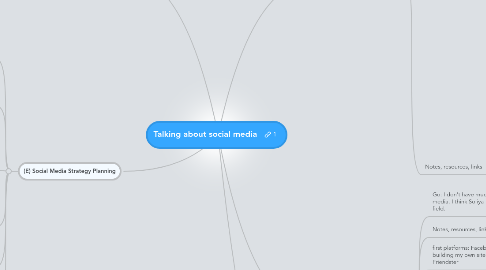
1. (B) Question 1: How do you define Social Media?
1.1. Open comment thread
1.1.1. Aseel: makes people feel more empowered, give them sense of responsibility, illusion that they are actually doing something
1.1.2. Aseel: platform for self-expression; an elaborate platform of word-of-mouth
1.1.3. Julnar: unlike traditional media, which is one-way, social media is two-way, which gives all SM networks characteristics of sharing/commenting/creating dialogue/conversation between users, and users are not only receivers of the message; they are consumers and producers. gives us a new term: prosumers?
1.1.4. Marta: a way to find information that you couldn't otherwise find; reach people you couldn't otherwise reach; a way to engage other constituencies;
1.1.5. naser: i spent the past few minutes coming up with this definition: naser: its a form of communication that creates a platform by which peoples online activities can be shared with their social network. naser: but i dont think that's what's cool about social media naser: its the fact that people can finally share their online world with others, whereas before the internet was mostly an observing experience
1.1.6. naser: word of mouth, in real life has the ability to be skewed and transformed the more times it passes. Social media does the word of mouth transfer but through accurate communication that can't be altered significantly to change the meaning naser: at the same time, propaganda can be spread much more effectively.
1.1.6.1. Julnar: but then how can you make sure that the initial story/news wa right?
1.1.6.1.1. New node
1.1.7. Henry: activation seems like a key part of it-- inspiration to do something/get involved in conversation
1.1.7.1. naser: A big part of news is giving your opinion. with social media, you can finally give your opinion which i think is really a big interest in news for a lot of people
1.1.7.1.1. Naser (in other words) people love to get angry over news and now they can.
1.1.8. is Skype social media?
1.1.8.1. Julnar: no. they are conversation, but you don't receive updates on what they are doing, not sharing stuff every day usually. same applies for Facebook chat; it is communication but similar to any chat. the bigger view is that you can share stuff, comment, others can comment at the same time... it is sharing and receiving updates
1.2. Notes, resources, links
2. (A) Introduction: watch this video
2.1. Open thread about the video
2.2. I like the part about using different social media to achieve different goals according to factors such as audience. I think this is key because I would say that linking social media websites (such as twitter with facebook) distorts the way that particular SM tool should be used. For example, Tweets in facebook just don't have the same effect because facebook has created a certain way by which its users communicate that almost makes tweets seem too abbreviated.
3. (E) Social Media Strategy Planning
3.1. Intro: Part of this Module will be having each of you come up with a social media strategy for an organization or cause that you care about. Having a clear strategy for using social media was identified by researchers as a major factor in the success of social media projects.
3.2. Please fill out this detailed form by our April 25th session, recording your detailed thoughts about the social media strategy plan you imagine for your cause or organiation
3.2.1. Social Media Strategy Planning Form
3.3. Question 1: Which organization or cause, in which you play some role as leader or supporter, do you feel could benefit from using social media to advance its goals?
3.3.1. Open thread
3.3.1.1. Aseel: putting Arabic folktales online, esp. Palestinian
3.3.1.2. Naser: related to his current freelance gig
3.3.1.3. Julnar: community space she is setting up (alt city)
3.3.2. Fellows' final choices
3.4. Question 2: What are your social media goals? Be very clear and specific, making references to details of your own cause.
3.4.1. Open thread
3.5. Question 3: Are your goals SMART: Specific, Measurable, Achievable, Relevant and Time-Based?
3.5.1. Open thread
3.6. Question 4: How do you define your audience? First, who are your constituents? Second, which of them can you reach with social media? Third, which constituents do you wish to reach?
3.6.1. Open thread
4. (C) Question 2: What is your experience with Social Media?
4.1. Go: I don't have much experience with social media. I think Soliya is my first experience in this field.
4.1.1. Naser: What makes Soliya different?
4.1.2. New node
4.2. Notes, resources, links
4.3. first platforms: Facebook, building my own site, Soliya!, Friendster
4.4. Naser: It's been a source of income, writing peoples' blogs is more exciting than writing my own.
4.5. what do you use a lot now?
4.5.1. Henry: Facebook, Snip.it, Twitter, Skype, YouTube, Google Docs
4.5.2. Go: Google Docs, Skype, YouTube
4.5.3. Julnar: Google docs, G+, Twitter, Facebook, Flickr, Skype, YouTube, Diigo, Delicious
4.5.4. naser: facebook, twitter, pinterest, reddit
4.6. what do you DO with social media?
4.6.1. naser: Mostly read, I'm really good at the listening aspect of SM but not so much in the communicating part of it.
